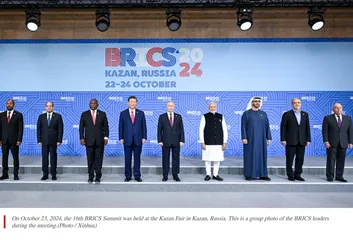Greater BRICS CooperationShapes the Future of the Global South
作者: Xu Xiujun

The collective rise of the Global South is a clear sign of great changes taking place in the world. It has resulted in the inception and development of the BRICS cooperation mechanism which in turn also offers driving forces for the all-round advancement of the Global South. The BRICS mechanism, a major cooperation platform of the Global South, has increased representation and influence with its expansion. It stands as a stronger force of solidarity and cooperation uniting more countries of the Global South.
Economic Rise of the Global South and Origin of BRICS
The economic rise of the Global South is a crucial foundation for the establishment of the BRICS mechanism and its continuous development.
I. BRICS Nations, Epitome of the Global South’s Economic Rise
The Global South has been on the fast lane of economic development since the 21st century. According to the International Monetary Fund (IMF), the GDP of emerging markets and developing economies in 2001 was approximately $7.21 trillion, accounting for 21.3% of the global GDP, an increase of 4.3 percentage points since 1991. Calculated by purchasing power parity, these economies represented 42.1% of the global GDP, up 6.5 percentage points from 1991. Brazil, Russia, India, and China had a combined GDP of around $2.71 trillion, representing 37.6% of the GDP of emerging markets and developing economies by market exchange rates, and 40.6% by purchasing power parity. By 2010, their combined GDP exceeded half of that of the emerging markets and developing economies, reaching 50.2%. It is fair to see BRICS nations as an epitome of the economic ascent of the Global South.
Recognizing the sound momentum and investment potential of these countries, Jim O’Neill, then Chief Economist at Goldman Sachs, coined the term BRICs in 2001. Subsequently, Goldman Sachs launched a BRICs fund to attract investment in emerging markets, focusing on opportunities created by the rise of the Global South. Initially, the concept of BRICs was viewed as a representative of emerging markets in investment terms.
II. BRICS Cooperation Mechanism, Product of the Global South’s Economic Rise
With a rising economic volume, the Global South enjoys growing influence in the global political and economic system day by day. At the same time, it also faces more constraints of the existing international system. On the one hand, the Global South struggles to match its influence with its capabilities or rights with its contributions. Despite increasing economic strength, its representation and voting rights in economic institutions like the World Bank and the IMF have not improved in tandem with economic growth. The gap has even widened, resulting in a bigger democratic deficit in global governance. On the other hand, the legitimate rights and interests of the Global South are not well protected. In the existing international system dominated by developed countries, a handful of them often undermine international rules to stifle the development of the Global South countries and harm their interests.
In this context, it is increasingly necessary and important to deepen cooperation among the Global South countries. That was how Brazil, Russia, India, and China, four major players of the Global South with significant international and regional influence, came together to initiate the BRIC and advance its development. In September 2006, the foreign ministers of the four countries held their first meeting on the margins of the UN General Assembly, marking the establishment of the foreign ministers’ meeting mechanism. In June 2009, the leaders of the four nations met in Yekaterinburg, Russia, upgrading the mechanism to a summit level.
In short, the context of the BRICS mechanism is the collective rise of the Global South. On the one hand, the economic rise of the Global South serves as an important foundation for its establishment. On the other hand, the BRICS mechanism adds momentum to the development of the Global South.
BRICS: New Cooperation Mechanism for the Global South
BRICS, a new cooperation mechanism for the Global South, offers a platform for cooperation among nations of the Global South, and provides them with a channel for participation in global governance.
I. BRICS Spirit Conforms to Historical Trends
BRICS countries champion and uphold the spirit of openness, inclusiveness and win-win cooperation, defend the UN-centered international system, the international order based on international law, and the basic norms of international relations underpinned by the purposes and principles of the U.N. Charter, and promote greater democracy in international relations.
Openness and inclusivity is a distinctive feature of economic globalization, and a hallmark of the BRICS mechanism that brings together countries with different social systems, cultures, and development models. Openness fosters progress. An open world economy makes it possible for nations to leverage complementary advantages and create synergy for global development. The BRICS mechanism does not target any specific nation or form exclusive political and economic groups, but helps developing countries participate in and benefit from BRICS cooperation. Upholding the principle of seeking common ground while shelving differences and promoting mutual respect, BRICS member states strive for common prosperity through cultural exchanges and mutual learning. Openness and inclusiveness is an inherent requirement of BRICS cooperation and an important guarantee for its steady development in the long run.